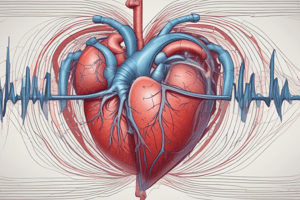Podcast
Questions and Answers
What is the equation for cardiac output (Q)?
What is the equation for cardiac output (Q)?
- Q = SV / HR
- Q = SV + HR
- Q = SV * HR (correct)
- Q = SV - HR
What is the equation for mean arterial pressure (MAP)?
What is the equation for mean arterial pressure (MAP)?
- MAP = 3/2 SBP - 1/2 DBP
- MAP = 1/3 SBP + 2/3 DBP (correct)
- MAP = SBP * DBP
- MAP = SBP - DBP
What is the equation for resistance?
What is the equation for resistance?
- Resistance = pressure/flow (correct)
- Resistance = pressure - flow
- Resistance = pressure * flow
- Resistance = flow/pressure
What is the formula for ejection fraction?
What is the formula for ejection fraction?
What does the VD/VT ratio measure?
What does the VD/VT ratio measure?
What is the equation for alveolar ventilation (VA)?
What is the equation for alveolar ventilation (VA)?
What is the formula for arterial-venous oxygen difference (a-vO2diff)?
What is the formula for arterial-venous oxygen difference (a-vO2diff)?
What is the equation for critical power?
What is the equation for critical power?
What is the formula for mechanical efficiency?
What is the formula for mechanical efficiency?
What is the equation for gross efficiency?
What is the equation for gross efficiency?
What is the formula for net efficiency?
What is the formula for net efficiency?
Flashcards are hidden until you start studying
Study Notes
Cardiopulmonary Equations
- Cardiac output (Q) is calculated by: Q = Heart Rate (HR) × Stroke Volume (SV)
- Mean arterial pressure (MAP) is calculated by: MAP = (2 × Diastolic Pressure + Systolic Pressure) / 3
- Resistance (R) is calculated by: R = Mean arterial pressure (MAP) / Cardiac output (Q)
- Ejection fraction (EF) is calculated by: EF = (End-diastolic volume - End-systolic volume) / End-diastolic volume
Respiratory Equations
- VD/VT ratio measures the dead space ventilation, which is the ratio of dead space volume (VD) to tidal volume (VT)
- Alveolar ventilation (VA) is calculated by: VA = (Respiratory Rate × (Tidal Volume - Dead Space Volume))
Oxygen Uptake and Efficiency
- Arterial-venous oxygen difference (a-vO2diff) is calculated by: a-vO2diff = Arterial oxygen content - Venous oxygen content
- Critical power (CP) is the highest power output that can be sustained over a long period of time
- Mechanical efficiency (ME) is calculated by: ME = (Work output / Energy expenditure) × 100
- Gross efficiency (GE) is calculated by: GE = (Work output / Energy expenditure including anaerobic and aerobic) × 100
- Net efficiency (NE) is calculated by: NE = (Work output / Energy expenditure from aerobic sources only) × 100
Studying That Suits You
Use AI to generate personalized quizzes and flashcards to suit your learning preferences.




